Unmanufacturing in Troy
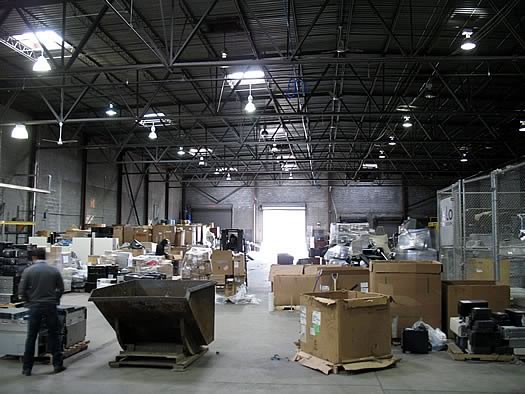
Where electronics start their afterlife.
Electronic gadgets are everywhere -- and in greater numbers every day. It's one side effect of an industry in which an item is considered "old" if was released just a year ago.
So, these items often have a short lifespan. And when the end comes, they have to go somewhere -- and increasingly, that place is not a landfill. As of the start of this year, businesses and municipalities in New York State are no longer allowed to pitch electronics into landfills. And by 2015 that restriction will apply to everyone -- even individuals.
With that in mind, a recent invitation to check out an electronics recycling business in south Troy made us curious to see where this stuff goes.
Well, that, and we almost never pass up the opportunity to see stuff get crushed.
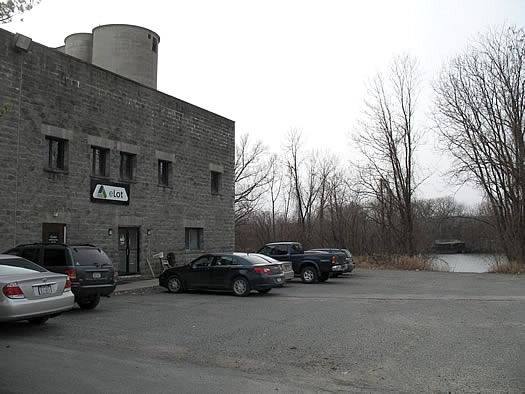
The facility for eLot Recycling sits along the Hudson River just north of the Menands Bridge. It's surrounded by buildings that look like they could use some recycling of their own. Just up the river is the Rensselaer County jail.
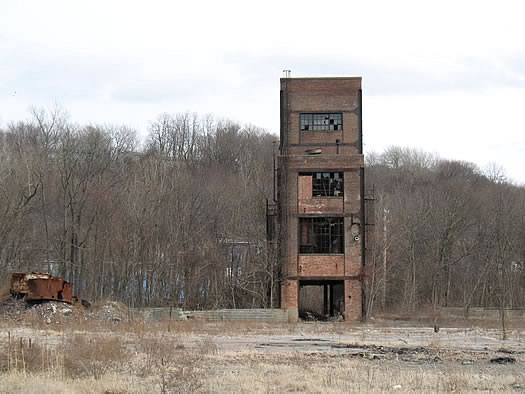
eLot takes "anything that plugs in," as company president Maish Freedman says. And the items stacked around the large indoor facility bear that out -- there are piles of old computers, monitors, server racks, batteries, and TVs (including old-school console sets that probably first flickered to life in the 1970s).
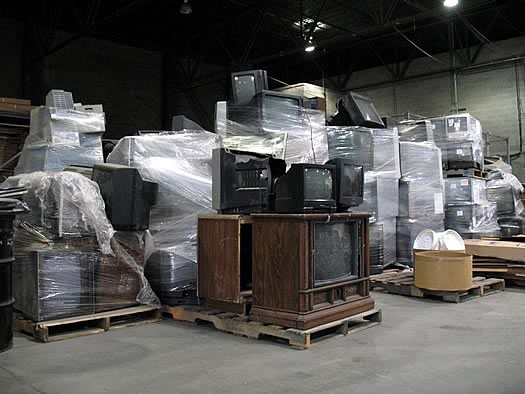
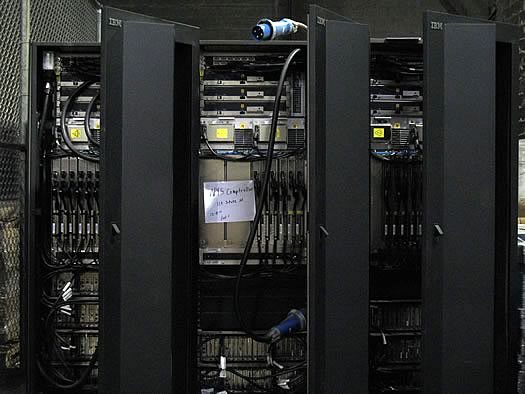
Freedman says the bulk of the company's business is taking in old computer equipment. But light bulb recycling is the fastest growing segment -- so much so that the company recently bought a machine to process the old bulbs right on site.
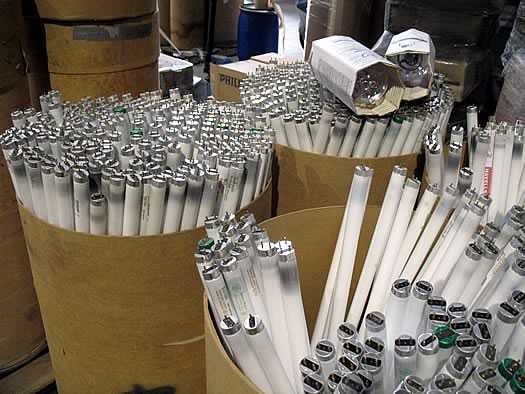
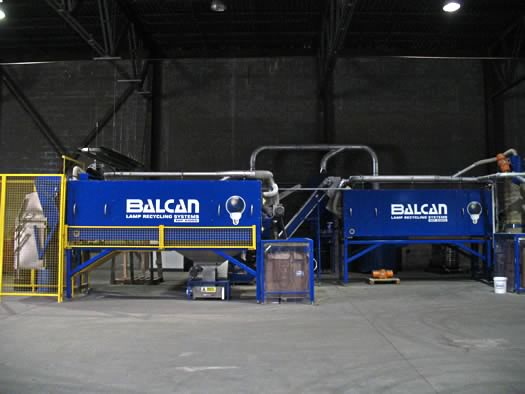
The company says the machine can process more than 3,000 of those four-foot fluorescent lighting tubes -- like the ones in the ceiling of almost every office or large building -- in an hour. And it figures the machine could break down as many 8 million in a year.
It's kind of remarkable to watch the tubes go in one end of the machine...
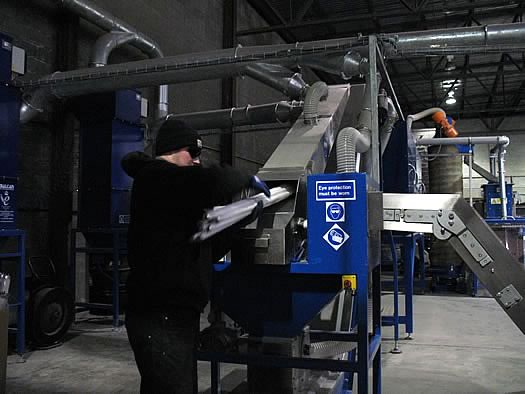
eLot's Matt Kinsley feeding the light bulb processing machine
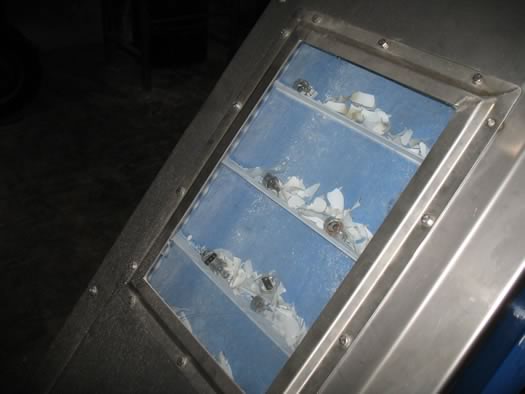
... and come out the other, broken down into their constituent parts, the plugs routed into one bin, the glass -- now broken up and blunted -- into another.
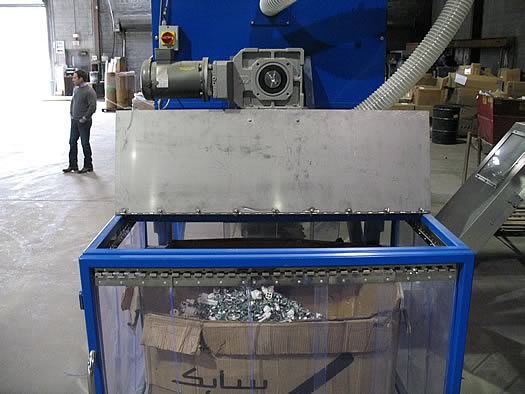
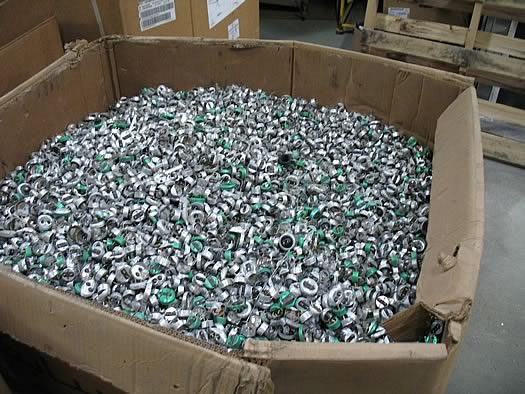
End caps from processed light bulbs.
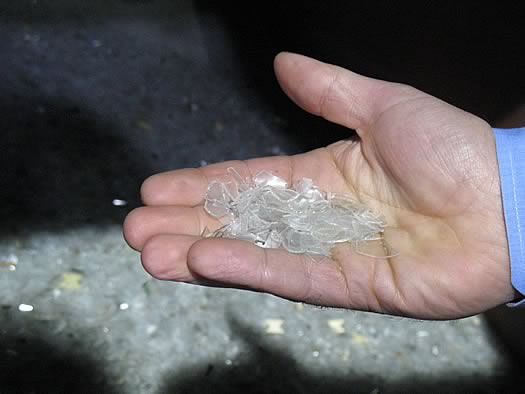
Processed bulb glass. The machine blunts the glass so it's not sharp.
The process sounds like someone turned on a sink disposal with a spoon in the drain.
A big market
Electronics recycling is an important environmental issue. Modern gadgets are full of substances best not released into the environment, including lead (monitors), mercury (fluorescent light bulbs), and cadmium (batteries). But, as Freedman says, "I'm not an environmentalist."
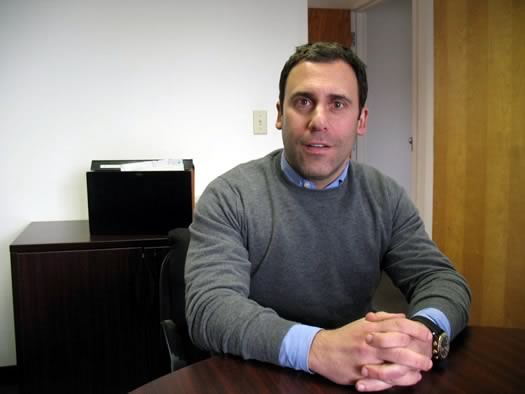
Maish Freedman
What's drawn him and his partners to the electronics recycling business is a large, growing market. The number of electronics is expanding rapidly -- as is attention and pressure to keep those electronics out of landfills. Freedman figures the laws banning TVs and computers from landfills will eventually be expanded to include fluorescent light bulbs, too. And the numbers of those bulbs are rapidly increasing because of the phase out of incancesdents.
"Every single business and person is a potential customer," as he sees it. And he says the company's business ranges from contracts with large institutional customers such as the MTA to individuals who come by with a box of old light bulbs. (It's currently not illegal to toss a fluorescent lightbulb in the trash, but the bulbs do contain a small amount of mercury, which can be released when the bulb is broken. So, tossing them in the regular trash isn't good for the environment.)
Of course, it doesn't really help if electronics sent for recycling just end up getting dumped somewhere else. There's been attention the last few years on old electronics ending up in developing countries, where they're broken down in ways that pollute the environment there. Freedman says the products collected by eLot are routed to processors in this country. "None of our products go to China."
Freedman's family has a long history in the scrap and recycling business. More than a hundred years ago, his great grandfather started a business in Troy collecting bottles, bones, and rags. That operation would become the R.K. Freedman and Son scrap yard in Green Island, which was sold to a UK company in 2010. eLot started as an offshoot of that business, setting up in Troy in 2007. Bones to CFL bulbs -- every society has stuff to throw away.
How to get rid of old electronics
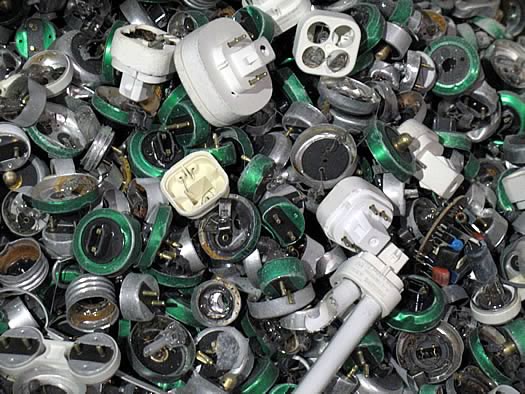
If you have old electronics you're looking to pitch, there are free options you should keep an eye out for. By state law, manufacturers are required to provide "free and convenient" collection of old electronics to consumers. Also look for electronics drop offs in your town or city (Freedman says eLot contracts with a bunch of local municipalities). Many cities have facilities or special days devoted to taking old electronics. For example: the city of Albany announced last week that it's now taking electronics Monday through Friday at its DGS facility in North Albany.
You can also drop off electronics at the eLot facility in Troy, Monday through Friday from 7:30 am - 4 pm. Each item is a few bucks to recycle, depending on the item -- a CFL costs about 30 cents to recycle and the price goes up from there.
Find It
eLot Recycling
8000 Main Street
Troy, NY 12180
Say Something!
We'd really like you to take part in the conversation here at All Over Albany. But we do have a few rules here. Don't worry, they're easy. The first: be kind. The second: treat everyone else with the same respect you'd like to see in return. Cool? Great, post away. Comments are moderated so it might take a little while for your comment to show up. Thanks for being patient.
Comments
Now if only there was somewhere I could take all this Styrofoam I'm dutifully saving from the landfill. A boy can dream....
Btw, do I understand one must pay to recycle? When I was a boy I'd look forward loading up the station wagon once a month and bringing our newspapers over to a place in Schenectady where they'd pay us for them. Guess eLots is gettin' it coming and going.
... said ChuckD on Feb 21, 2012 at 6:55 PM | link
Cool article! Hits both my obsession with consumer waste and my love of "how it's made"-style peeks into industrial environments.The light bulb machine is amazing... never really thought about how you'd go about breaking one of those down safely.
You'll let us know if you hear of any free e-waste drop-off days, right? I have a few chunks o' metal and plastic I'm holding onto for such an occasion.
... said Katie on Feb 21, 2012 at 6:58 PM | link
So how does the light bulb crushing machine safely capture the mercury?
... said Megan M on Feb 21, 2012 at 10:17 PM | link
@Megan M: That's a great question. The website for the company that the makes the light bulb crusher has a conceptual diagram about how the machine works. It says there's a filter that catches mercury vapor.
... said Greg on Feb 21, 2012 at 11:34 PM | link
Awesome article, thanks! I live in Troy and have seen those elot signs many times and wondered what it was about. Thanks, Greg, for the info on how they capture the Hg. I'd been wondering about that, too!
... said Amanda on Feb 22, 2012 at 9:35 AM | link
@ChuckD -- You're thinking of a scrap dealer like Predel's which mostly collects things for which there,'s a positive market. I don't even know if that market is there for newspaper anymore, but copper, steel and sor plastics usually pay. There's so much processing work involved in getting a useable product out of eletronics that the recycler has to get paid on the front end. Recycling centers that handle all kinds of materials hope to make enough from the few profitable materials to convert the rest of the junk.
... said Carl on Feb 22, 2012 at 2:34 PM | link
Great story!
So what happens to the stuff after eLot is done breaking it down. Where does it go? What does it become?
... said celinabean on Feb 25, 2012 at 2:49 PM | link
Like celinabean, I'm wondering where the waste goes... I read that Mr. Freedman says it doesn't go to China, but there are many more third-world countries where electronics and other toxics are being dumped. What exactly would happen to my e-waste if I brought it to eLot - what is the chain of custody??? I certainly don't want to be responsible for poisoning elsewhere in the world...
... said ankor on Apr 25, 2012 at 2:36 PM | link